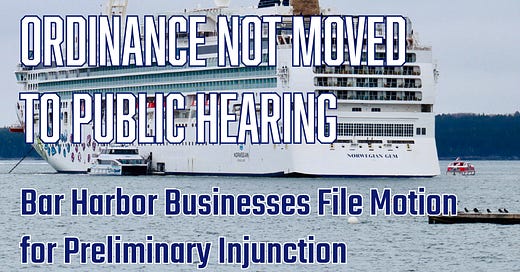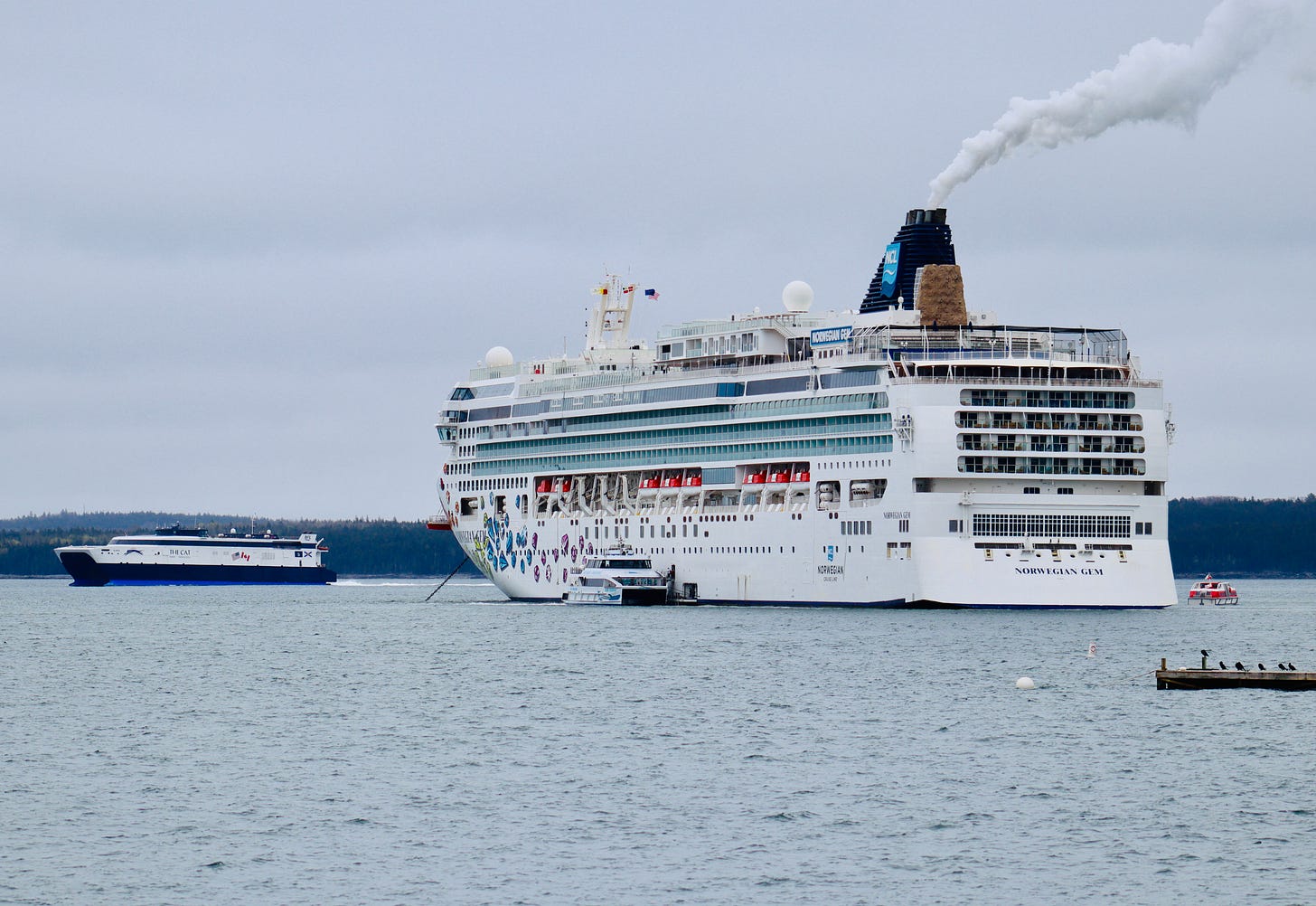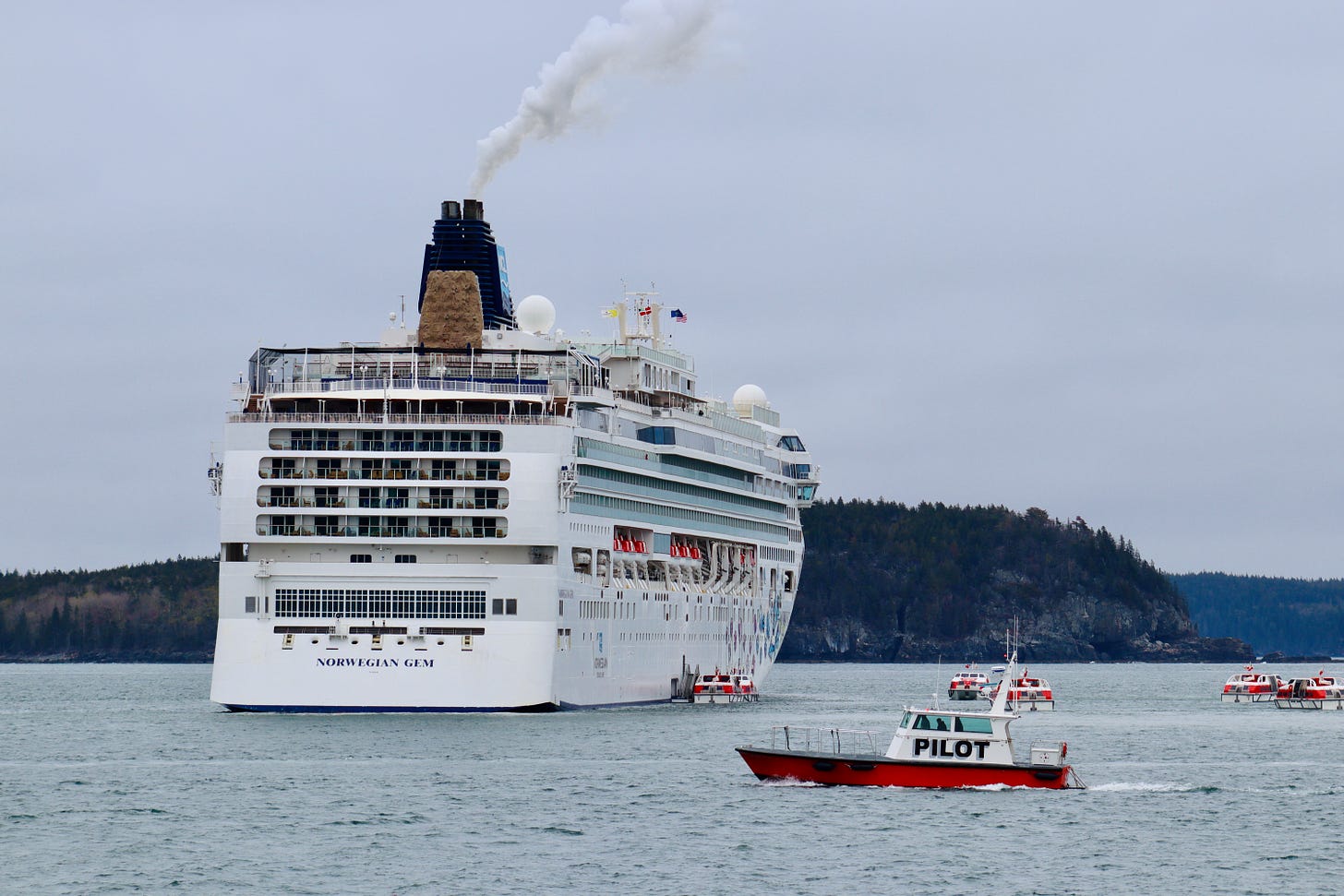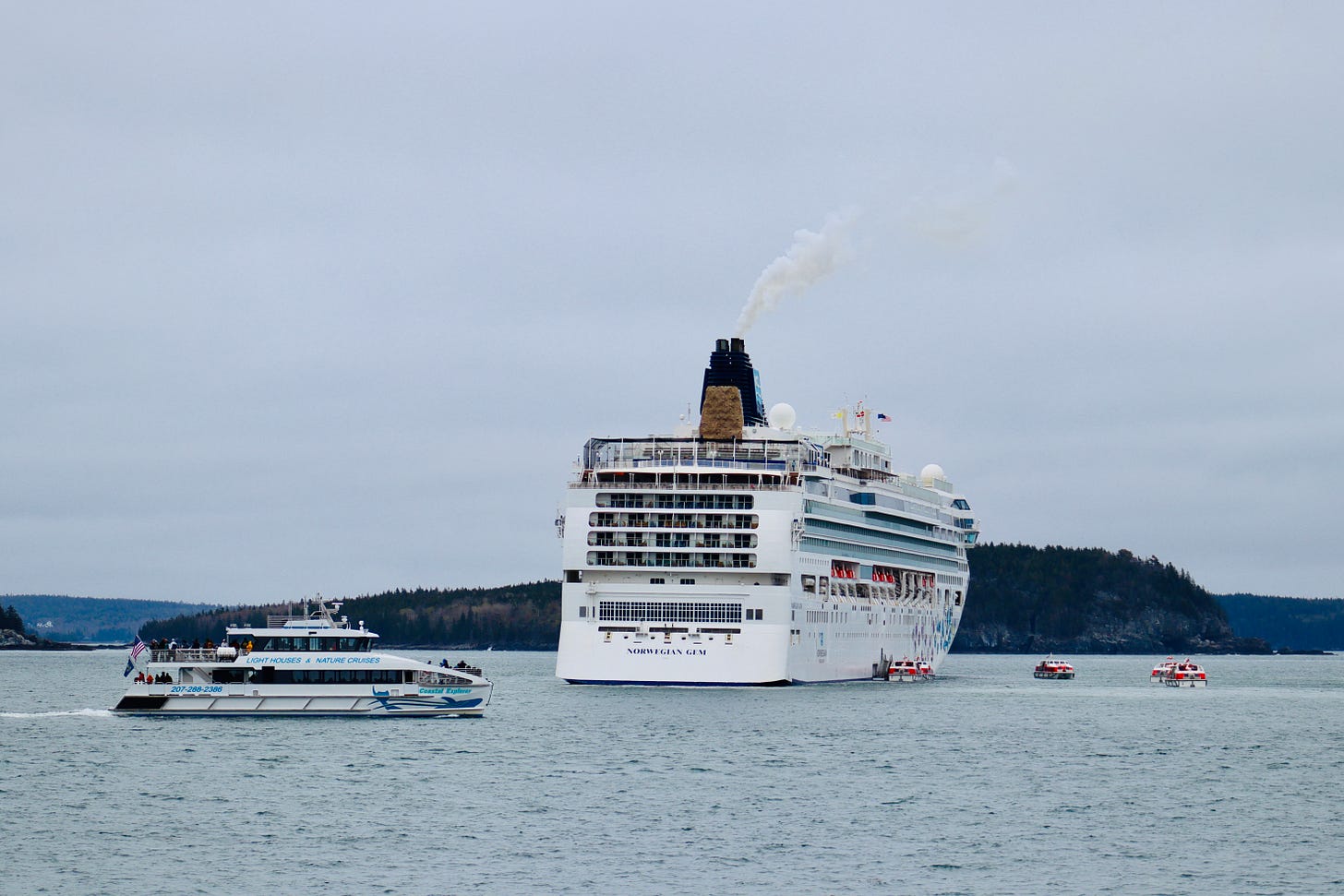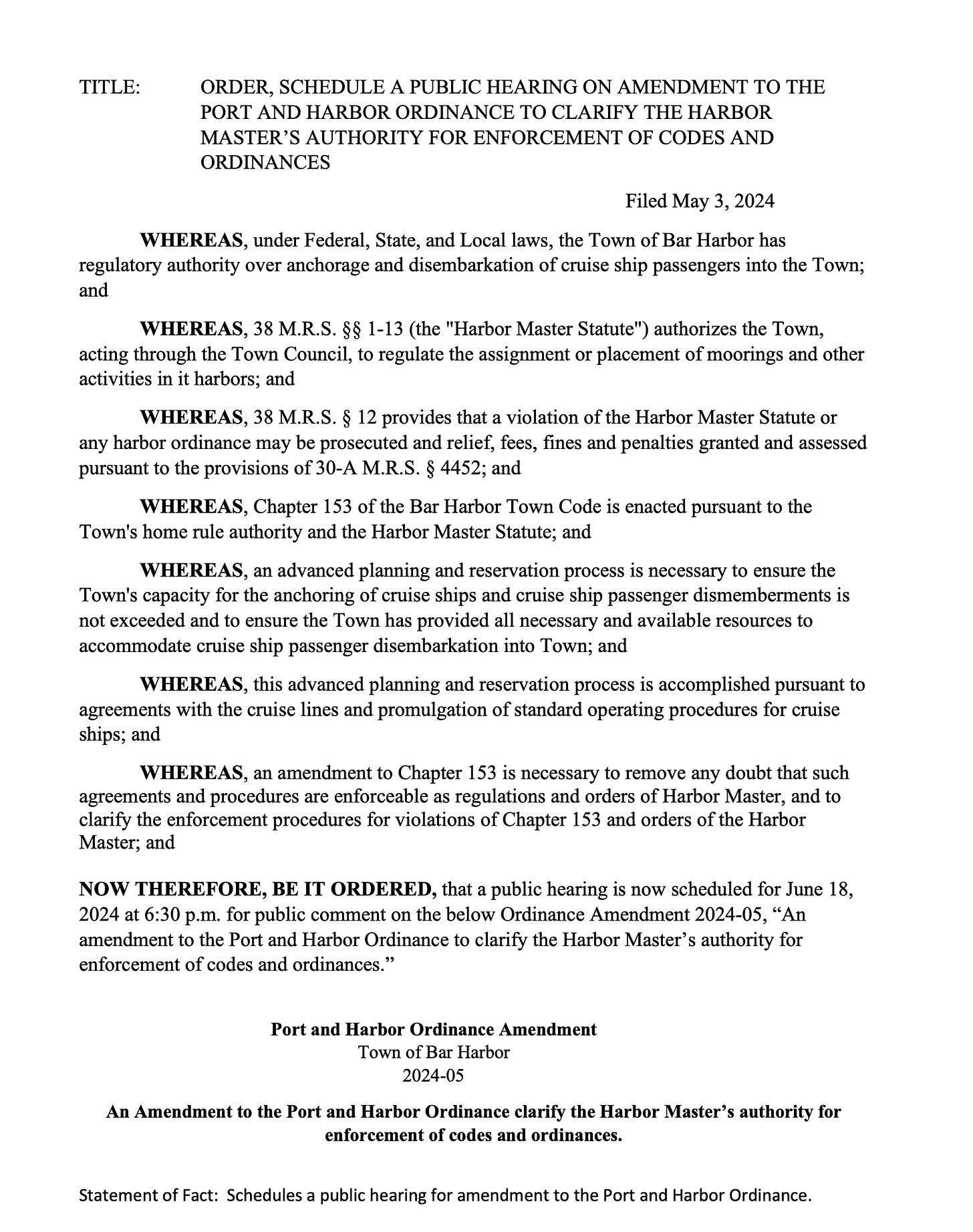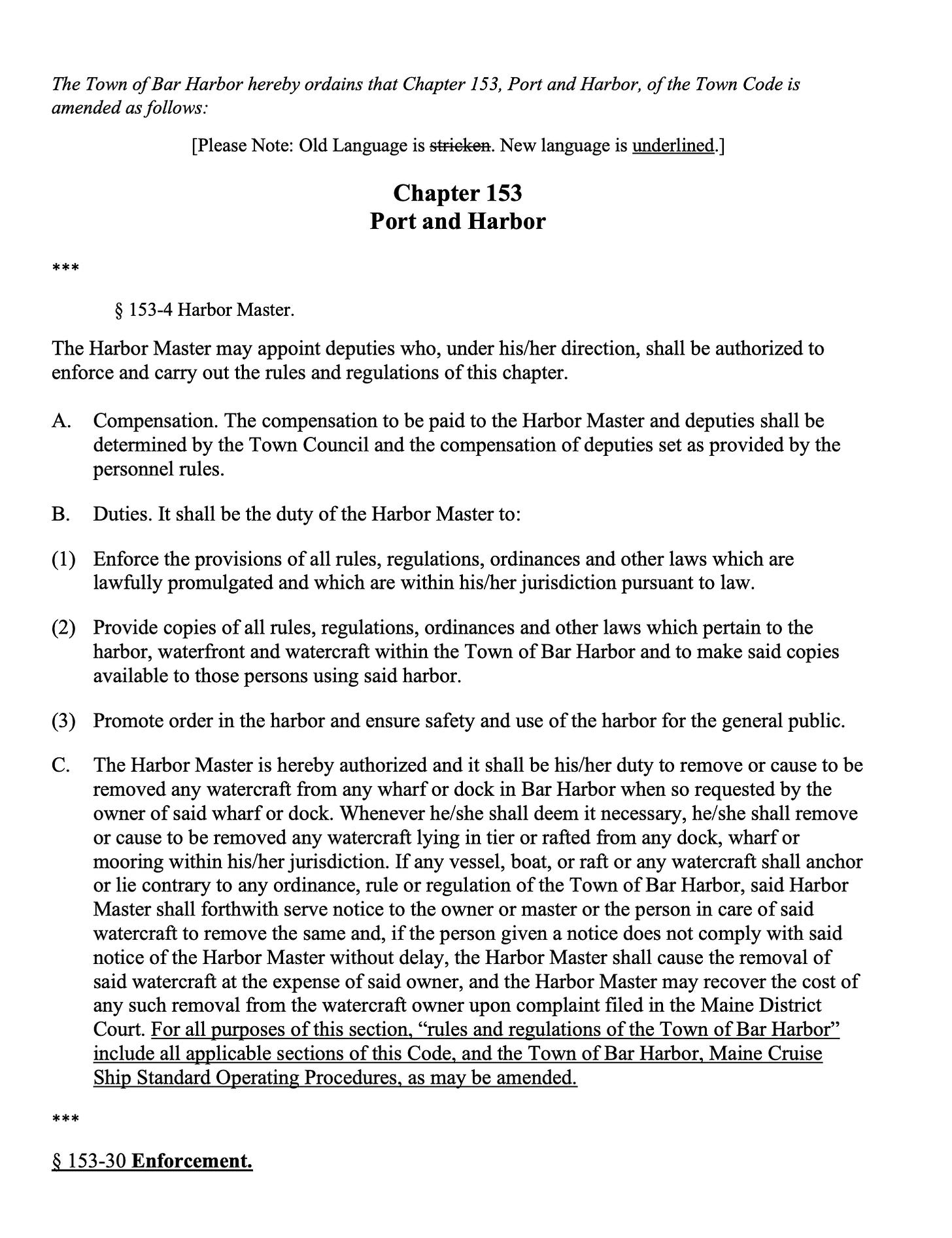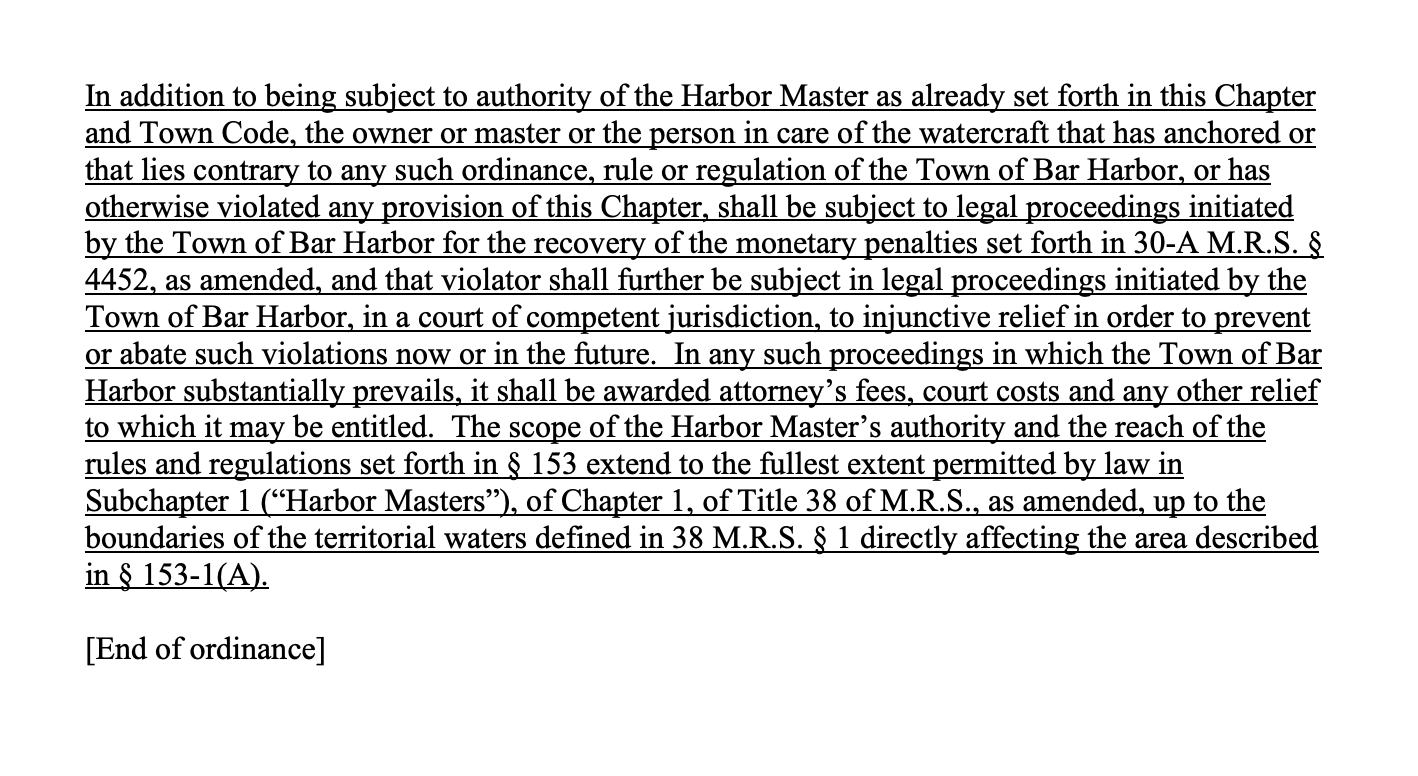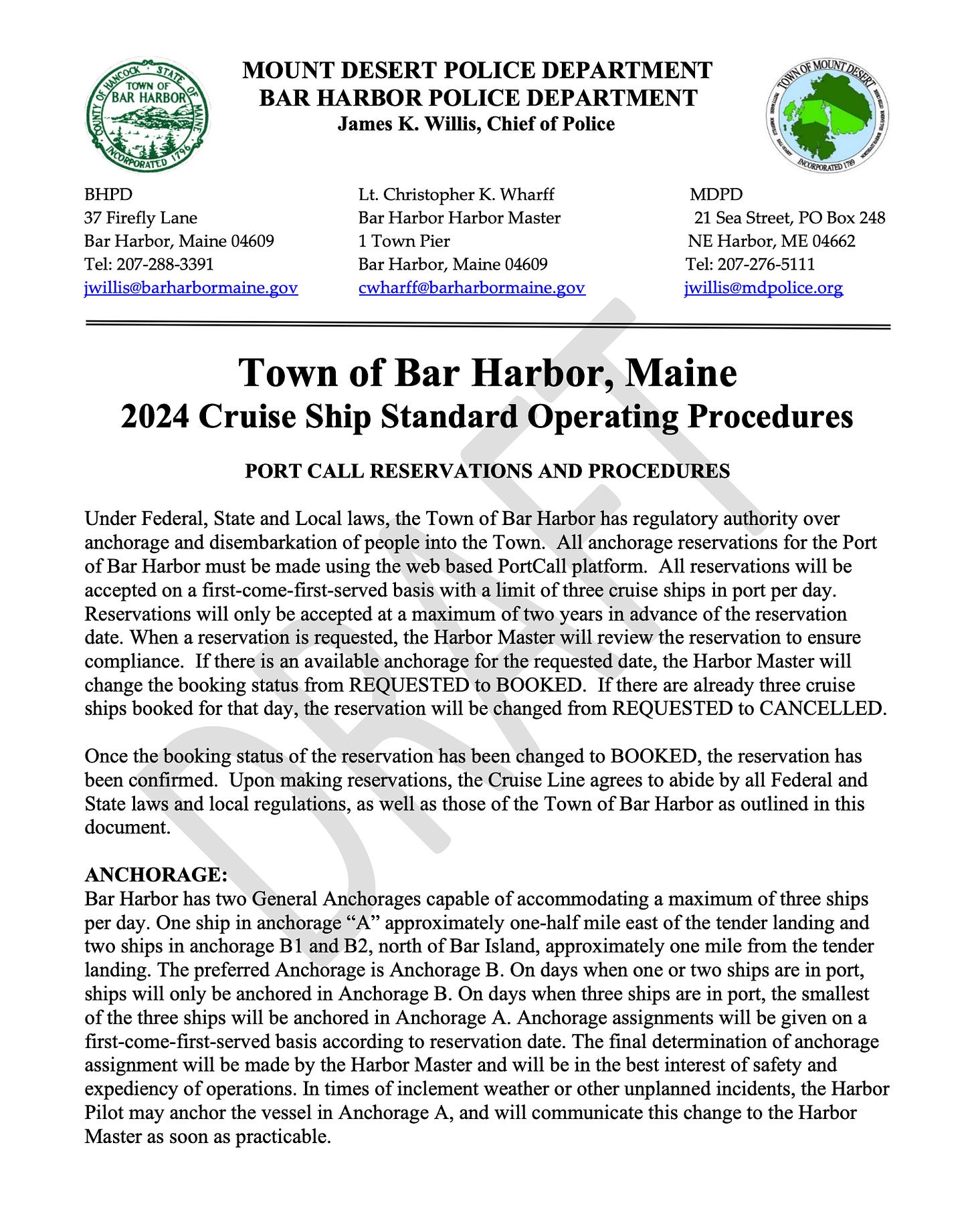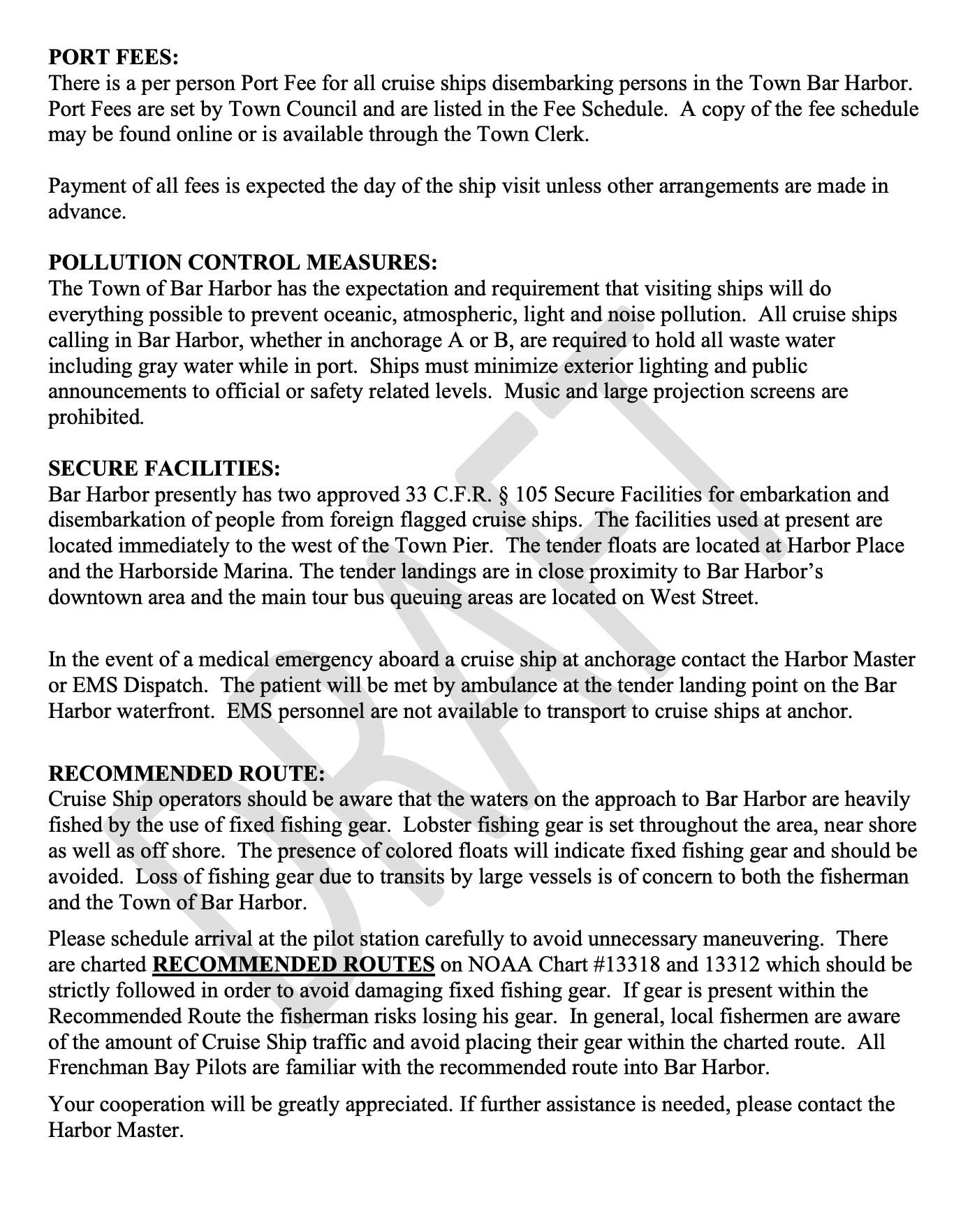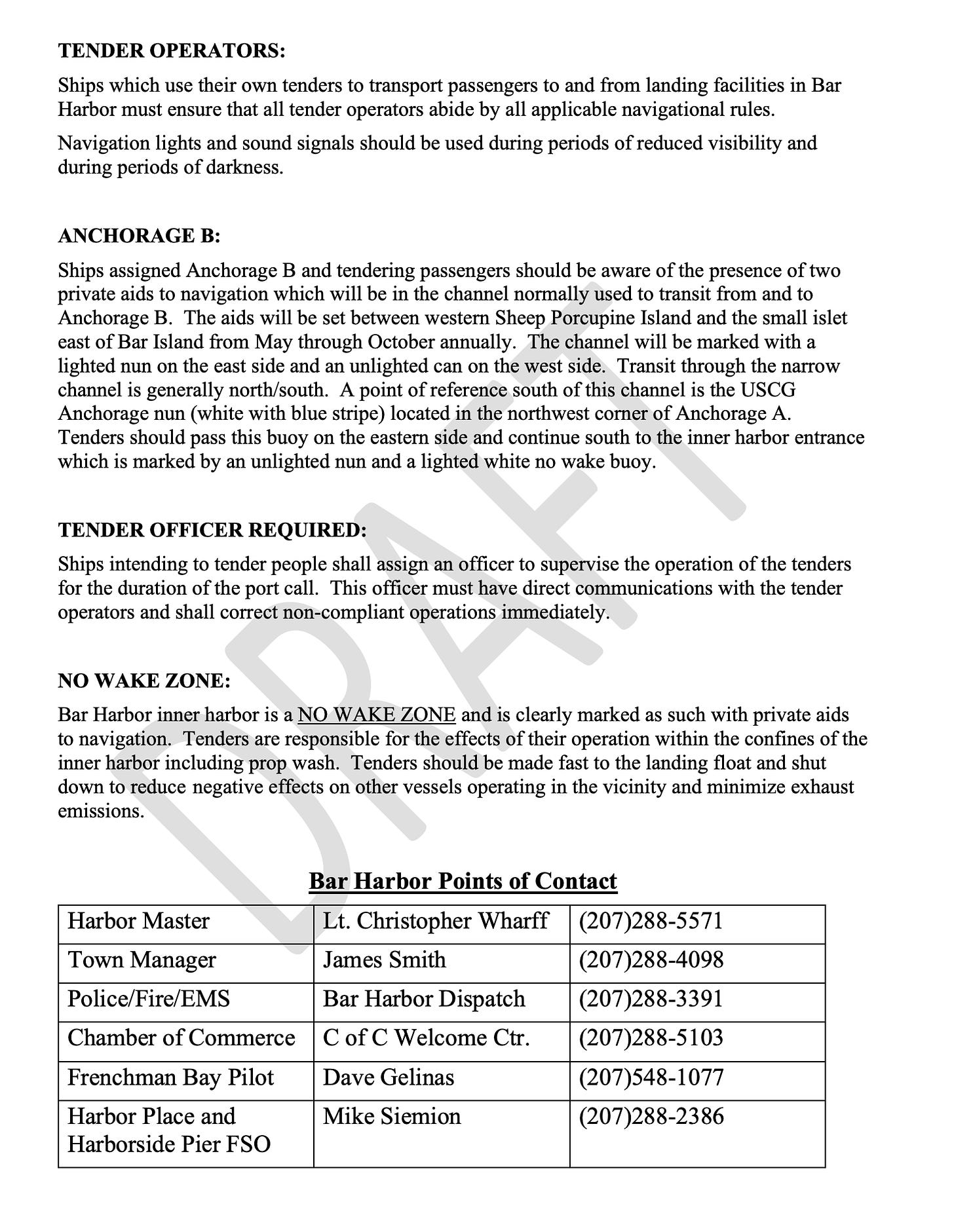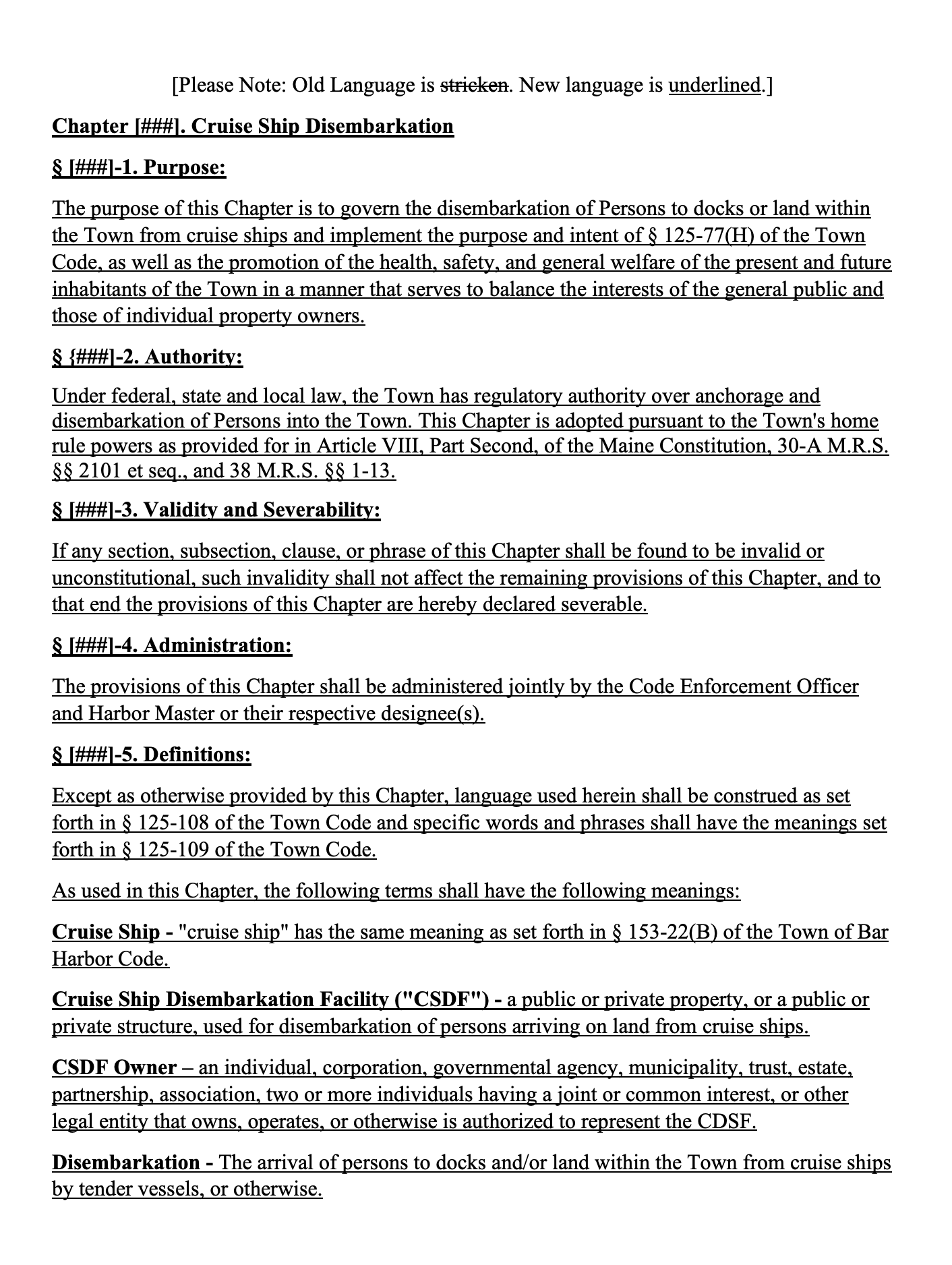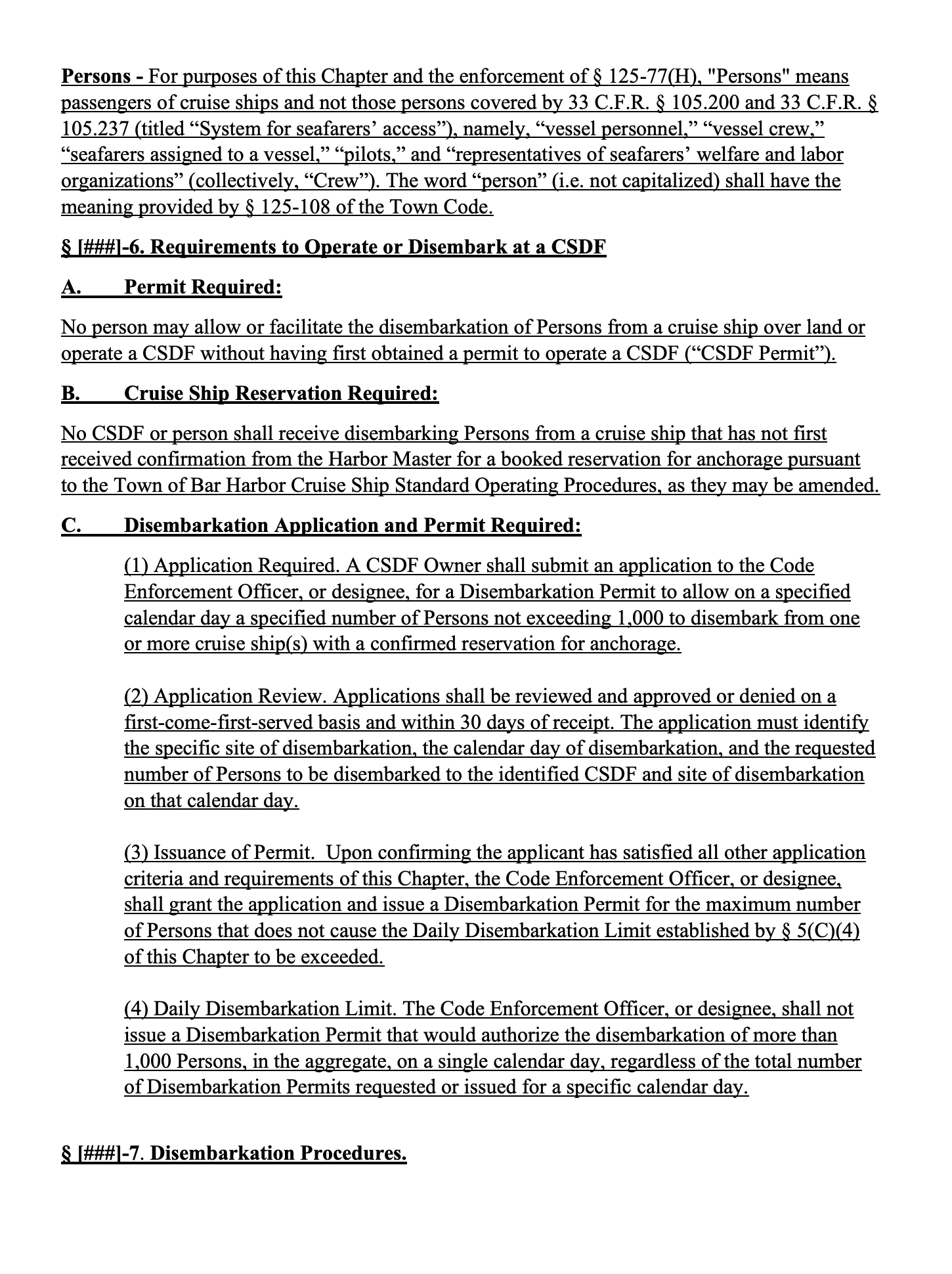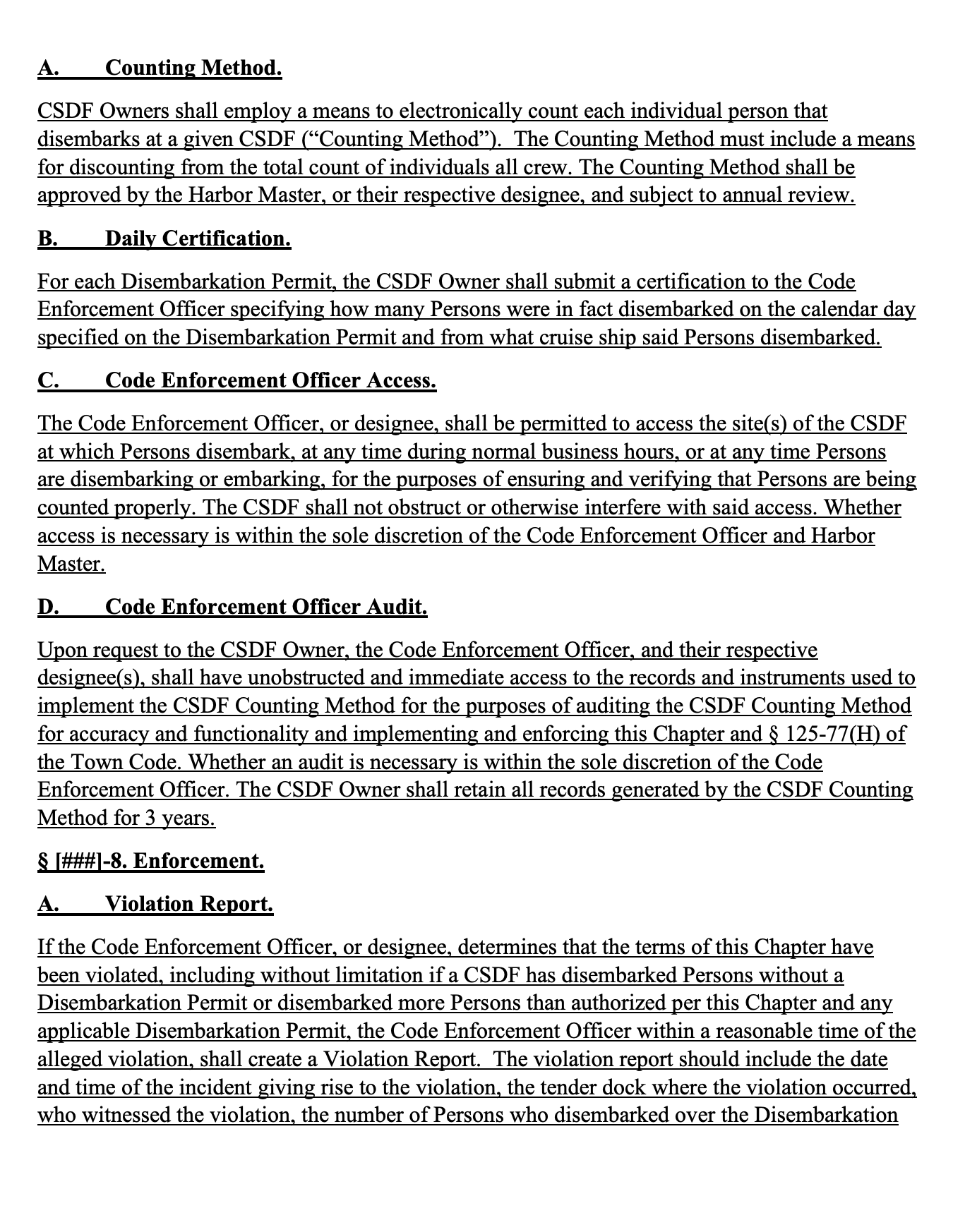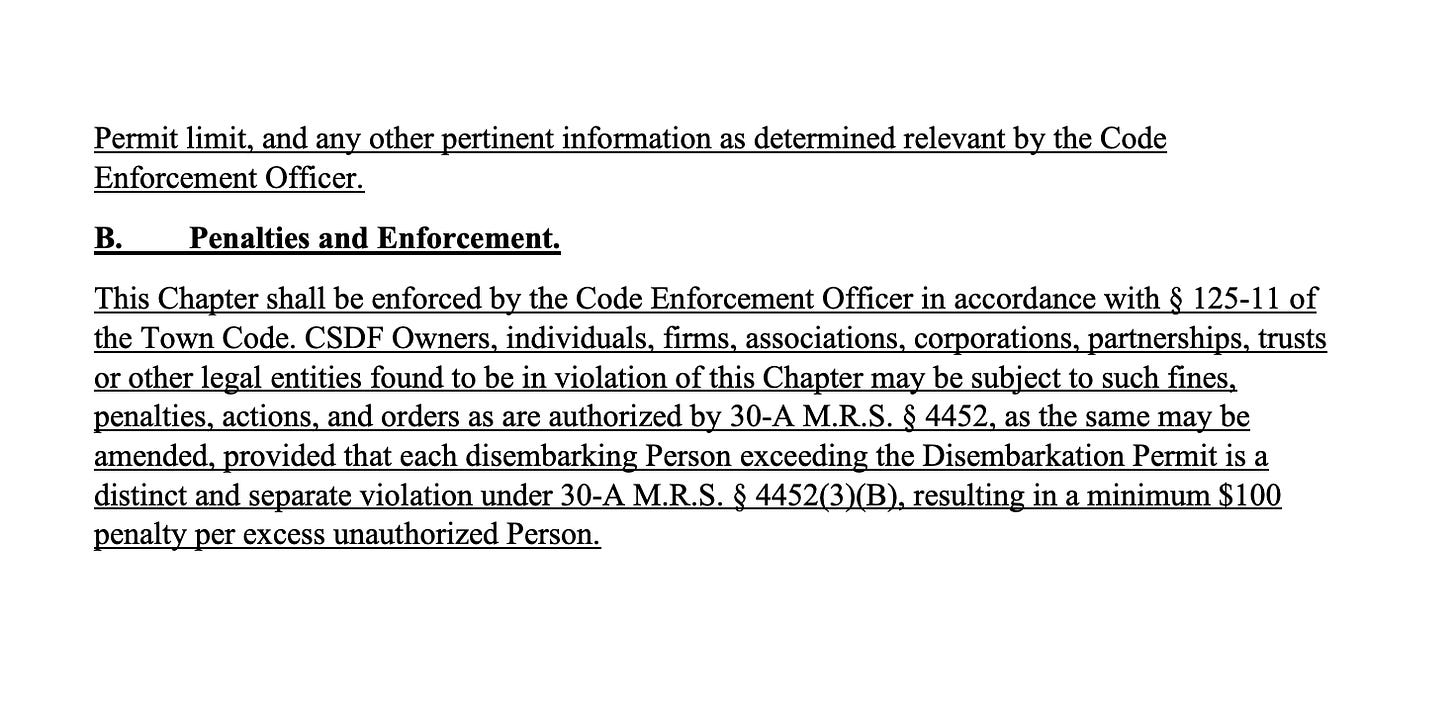Cruise Ship Ordinance Not Moved to Public Hearing
Bar Harbor Businesses File Motion for Preliminary Injunction
BAR HARBOR—Bar Harbor’s cruise ship saga continues this week with the latest installment occurring at the end of an almost-five hour Town Council meeting, May 7, as the councilors tried to move forward despite multiple lawsuits and a complicated ordinance.
Also on May 9, APPLL released a press statement about the motion to file a preliminary injunction, which we wrote about last week. The town has also asked the court to dismiss another cruise ship case, involving lead petitioner Charles Sidman. The press release is at the end of this article.
CRUISE SHIP ORDINANCE PAUSE
After more than 90 minutes of discussion about changes to the Harbor Ordinance and the still-being-drafted Cruise Ship Ordinance, the Town Council moved the Harbor Ordinance changes to a June 18 public hearing. This is after the election.
The Council took no action on the Cruise Ship Ordinance itself after hearing multiple legal questions during public comment, much of which came from two attorneys who are representing the Association to Preserve and Protect Local Livelihoods (APPLL), which is appealing the town’s ordinance along with the Penobscot Bay Pilot’s Association.
The ordinance changes, approved by voters in November 2022, cap cruise ship disembarkations to 1,000 or less a day without fines. It also places the changes within the town’s land use ordinance and at least partially under code enforcement’s purview.
Back in 2021, a town survey that elicited almost 1,400 respondents, found that of those respondents, 55 percent thought the overall impact of cruise ships was negative. The same percentage found that the ships detract from Bar Harbor’s image as a tourism destination connected with Acadia National Park.
The town had been managing cruise ship arrivals through memorandums of agreement between the town and the cruise lines. The most recent agreements set daily limits of 3,500 to 3,800 passengers and also monthly limits, which town officials believed would make cruise free days each month. The limits changed depending on the season. Much of the town’s business community had supported this plan.
Tuesday night was the second iteration of the draft rules to enforce and implement the Cruise Ship Ordinance, which requires rules to be implemented for it to be enforced and enacted. Town staff has prepared the rules, a process which Town Attorney Stephen Wagner said is consistent with the direction the Council has provided.
That rule making for the limits was paused during litigation. After the federal bench trial in 2023, the Town Council authorized staff to proceed with making those rules, which it announced in a March 6 press release, despite the appeal of the ruling, which was in favor of the town.
Charles Sidman, a lead petitioner of the citizens’ initiative to make those restrictions, has filed against the council, councilors, and also begun an administrative appeal, seeking a more aggressive enforcement. On Friday, the plaintiffs filed an injunction pending appeal. An injunction is a request to stop the action from occurring until the outcome of the appeal. Sidman is also running for Town Council. Two sitting councilors—Vice Chair Gary Friedmann and Joe Minultolo—are running for re-election. There are two seats available.
Wagner advised councilors, Tuesday, to allow public comments, but encouraged them not to respond themselves nor allow the town staff to discuss litigation, council’s authority for the actions, legality of press statement, constitutionality of ordinance, and other things relating to the appeal. Minutolo had an excused absence from the meeting.
CRUISE SHIP ORDINANCE
Harbor Master and police Captain Christopher Wharff presented the staff’s joint effort to try to put into practical terms the land use amendment that was passed.
“A large part of this ordinance, I feel like, is me delegating authority to code enforcement to issue permits to docks to have a cruise ship disembarkation facility and also to have a daily disembarkation permit for a certain number of passengers at each given facility that may have a permit,” he said.
He said they’ve had “deep discussions” about Wharff’s position as a law enforcement officer, which he said is a trend for harbor masters across the state.
Part of the distinction that the town is trying to draw is the harbormaster’s water-focused duties and the code enforcement officers’ duties about land rules and permits.
There are two layers of permitting. The first is to operate the facility where people disembark from the cruise ship. The second is the daily disembarkation permit.
WORRIES ABOUT THE PROPOSED ORDINANCE AND LITIGATION
“Going down this path, you are assuming some amount of risk. Choosing not to go down this path, you are assuming some amount of litigation risk,” Wagner told councilors.
“We’ve put in as much good faith as we can to try to make this thing work and we have to figure out if we can make this work,” Council Chair Valerie Peacock said. If it doesn’t work, the town has to figure out how to change the ordinance. She said it was just her perspective, but that “there’s not a lot of tweaking that can happen to this that’s gonna get us to where the ordinance is trying to get us to be and do.”
Town Manager James Smith said it might be preferable to clean it up within the land use ordinance rather than creating a second ordinance to bring in the “big picture ideas” that the town clearly voted in favor of.
Friedmann said that what was before the Council was a very clean and reasonable approach and that it is the council’s responsibility to implement the changes.
“I’d really personally, just speaking for myself, would much rather have us come to some kind of compromise, political agreement, rather than suing the hell out of each other, which is what’s happening right now,” Friedmann said. “We’re just getting it from all sides. And I think that if we could bring APPLL to the table to talk about something reasonable then that would be preferable to us just bantering back and forth about the peculiarities on this particular document which was kind of forced on us to do.”
He added that he hoped that APPLL heard that a majority of the voters wanted a significant reduction in cruise ship visitations. If so, then they could find something less stringent than the citizens’ initiative to lower the amount of cruise ships visiting. Many had argued in the past that those proposed MOAs were just that. Approximately 250,000 visitors had been arriving each season between May and November. Fees from the cruise lines have benefitted the town’s budget. APPLL has said that the income from cruise ships has allowed many businesses to stay open longer.
Later in the meeting, APPLL board member Shawn Porter said she appreciated the work of the council and its position. Her position is not any easier, she said.
“I can also appreciate the vote and the will of the voters.” She said she’s heard from many voters who didn’t know what they voted on.
She’s had her store for 33 years, she said. “For 32 years, we were able to plan, staff, and buy inventory with an idea of what our season would look like and now we can’t do that.”
They’ve given up one of their three business locations, they’ve stopped ordering from certain businesses. “Whatever you choose to do, please do it in a way that we can plan for our business, our families, and our future in the community.”
She said her business and APPLL have always wanted to work with the town.
“Decades of work shouldn’t be undone in two years,” she said.
The town is also currently embroiled in another court case about its charter changes.
“We’re sitting here in executive sessions like every other meeting talking about which lawsuit and how we’re going to deal with this stuff. I just think that this is untenable,” Friedmann said.
PUBLIC DISCUSSION: “DISMEMBERMENTS” AND END OF DISCUSSION
Andrew Hamilton of Eaton Peabody in Bangor, which represents APPLL and the pier owners said of the draft ordinance, “I think you’ve got structural issues, I think you’ve got concept issues, and I think you’ve got language issues.”
One of those issues is that the ordinance talks about dismemberments. That typo could easily be fixed. What might be harder to deal with, according to Hamilton, is that there is no health safety and welfare issues according to police and fire officials, which is in the wording of the ordinance’s purpose. He also talked about severability of the ordinance and the definition of “person.”
According to Contracts Counsel, “A severability clause is a contract term that ensures the validity and enforceability of the remaining parts of an agreement if one provision is found unenforceable.”
Hamilton told the Council, “You’re seeking to impose an application requirement on a property owner that has existing rights under the law and you’re going to expect him to apply for a new permit and for that new permit to issue in a way that regulates him differently than his existing permits and the non-conforming issues. It’s not going to happen. There will be no application. There will be no acceptance of a permit under this permit.”
After eight minutes of Hamilton’s comments, Friedmann said, “I don’t think that I feel like I want to listen to this anymore. I feel like you’re lecturing us and giving us legalistic arguments. This is—we’re really here tonight to discuss the specifics of this ordinance.”
Peacock asked for Hamilton to send the rest of his comments in writing and said that there’d be another chance for him to comment in public hearing. Hamilton said that he’s looking for an opportunity to get into a constructive offramp away from litigation.
“We’ve never wanted to be in this spot, and I see this as trying to help rather than put up road blocks for you guys. I think that there’s been some very good advice given from us,” Porter said, gesturing toward Hamilton, “and there’s never been a time that we didn’t want to work for the town.”
“You feel like your stuck? How do you think we feel? We’re just not going to tolerate it,” Hamilton said after Friedmann’s comments. He added he didn’t understand why the Council couldn’t pause to have constructive conversations. “We would plea with you, defer action.”
DECISION
The council decided to not move the Cruise Ship Ordinance to public hearing yet.
Wagner summarized the direction of the Council as asking him to respond in executive session to address legal concerns about the ordinance which may or may not result in changes to the ordinance.
Executive sessions are closed portions of meetings that do not have minutes. A town council cannot take action in those meetings, but it can have certain discussions which are protected from the public. Executive sessions are often used for litigation and personnel issues. Earlier in the May 7 meeting, during discussion of the town’s Higgins Pit solar array project, Councilor Maya Caines asked for the council to try to avoid those sessions as much as possible.
Friedmann asked Smith and Council to not delay the meeting about the ordinance beyond June for public hearing.
HARBOR ORDINANCE MOVES FORWARD
While the Cruise Ship Ordinance itself had a bit of a pause, the changes to the Harbor Ordinance moved forward.
This amendment, Wagner said, didn’t change any substantive requirements, but gives extra enforcement to the harbor master. Smith said it is basically a clarification to the harbor ordinance.
Hamilton questioned preemptive authority in how ships come into federal anchorages.
Tim Woodcock, also from Eaton Peabody in Bangor, argued that they haven’t yet litigated how the ordinance has or is being applied, just whether or not it is constitutional. How the ordinance is applied raises a practical problem, he said, because the proposals either enlarge or clarify the harbor master’s powers, which he said are powers that are over the water rather than the land. “Now,” he said, “you are reaching out over the water and trying to control the cruise ships themselves.”
“You may find that you are exercising authority that you do not have,” Woodcock said.
State statues, he said, allow harbor masters to regulate moorings. This, however, deals with federal anchorages. He asked the town to “go slow with this, think it through, make sure you’re on solid ground.”
He said the ordinance makes it so that no one is fined except for the pier owners. “Nowhere in the ordinance, however, do the pier owners have the authority to prevent the 1,001 person from coming ashore.”
The fines escalate from $100 to $5,000 per person, Woodcock said.
“How can you impose a punitive regime on a property owner without giving them the means to avoid the action?” he asked.
There are also very strict limitations on where criminal trespass warnings can be issued on private property opened as public spaces, he said.
Wagner told the Council that he could prepare an opinion responding to those opinions and the Council could review it in executive session.
“Some of those questions raised are questions that I’ve had all along,” Councilor Matthew Hochman said. “I would love to get those answers….There are some valid questions.”
WHAT IF THERE IS AN EMERGENCY AND THE DISEMBARKATION LIMITS HAVE BEEN HIT?
Councilor Kyle Shank said that he wanted to make sure that there is a procedure to deal with emergency situations on cruise ships.
“We’re never ever going to tell a ship that they can’t anchor in the case of an emergency,” Wharff said.
Shank said he was more worried about disembarking in an emergency. Those situations could be a singular medical emergency that requires onshore medical help after the disembarkation limit has been hit or a disaster that requires an evacuation.
“You don’t throw out common sense in those situations,” Wharff said.
OTHER COMMENTS
“The harbor master has been denying anchorages to the town of Bar Harbor for a lot of years,” Peacock said after anchorages were mentioned by the lawyers for APPLL. That’s because there are only three anchorages and those are assigned by the harbor master on a first-come and first-served basis.
Discussion moved to this being a common practice in all municipalities that have moorings and anchorages.
The town, Smith said, is trying to draw a clear distinction between the harbormaster’s role of permitting anchorage in the harbor and the code enforcement officer’s role in the regulation of the disembarkation of passengers.
Hamilton said that the placement of the standard operating procedures into a land use ordinance is a concern for them.
APPLL board member Tom Testa said, “Last year, Mr. Sidman referred to all of us business owners as tumors. I see in the proposed next ordinance something about dismembering the passengers. That’s rather Draconian.”
There are many complex questions that have been brought forth, he said.
“They are going to increase risk across the board to everyone,” Testa continued. “Both legal, economic, and budgetary. You know, this impacts all the businesses, employees, their families who rely on tourism and we just hopefully suggest that Council seriously consider all the aspects because these questions can be numerous and they shouldn’t be forced for an answer. So, please do the right thing and get an answer.”
APPLL Treasurer Eben Salvatore, who also works for one of the parties in the suit against the town, said he appreciated and felt badly for the position the council is in. He emphasized the difference between persons and passengers and suggested fixing that language could be an offramp.
Kristi Bond, APPLL board president, thanked the councilors for their time and hard work. “We have to use common sense as we make our decisions.” The ballot wording was a bit blurry, she said, and that many voters didn’t realize what such a disembarkation cap would mean. The 1,000 cap would prevent all cruise ships from visiting, she said. She said that APPLL and much of the Bar Harbor business community understood the sentiment about managing tourism and everyone should work together to make that good management happen.
“APPLL was never the one picking the fight here. We’ve been playing defense since day one, defending our livelihoods, and our businesses and ourselves to an ordinance that I appreciate is now the town’s ordinance but was not designed or developed by the town, but was designed and developed by Charlie Sidman,” Bond said. Now, she said, it’s up to them to work together and figure it out.
Friedmann moved the Harbor Ordinance changes to public hearing. Caines seconded, and it was unanimously moved forward.
APPLL PRESS RELEASE
Businesses are concerned that hundreds of thousands of tourists are being turned away.
BAR HARBOR—The Association to Preserve and Protect Local Livelihoods (APPLL), a non-profit group of many Bar Harbor residents, businesses and employees, has filed a motion for preliminary injunction in the federal appeals court. While the court found in favor of APPLL in part that the ordinance was in violation of the law, the court left to be resolved some of the ordinance that we believe requires further review. The Town has worked with APPL through this legal process to honor agreements with the cruise industry while litigation was taking place. Unfortunately, Town Officials are being pressured by the author of the ordinance to breach this understanding prior to the final resolution of the legal process, which magnified the need to request this injunction. If approved, the injunction would halt the Town from enforcing Sidman Ordinance until a final non-appealable decision by the courts.
The ordinance authored by Charles Sidman through a ballot initiative limits the number of persons who can disembark from a cruise ship to no more than 1000 per day. More than 90% of the cruise ship passengers and crew that visit Bar Harbor do so on ships with passenger capacities of more than 1000. In effect, this disembarkation limit acts as a ban on cruise ships with a capacity of more than 1000 passengers visiting Bar Harbor.
According to a study done by Professor Todd Gabe at the University of Maine, cruise ship visits contribute about $20-30 million annually to the town’s economy. Without cruise ships stopping in Bar Harbor, those dollars will go elsewhere. This will result in the loss of many jobs and permanently harm many small local business owners, their employees, and families.
Despite the appearance of concern for the wellbeing of Bar Harbor, APPLL says the unstated intent of the Ordinance proposed by Sidman was to eliminate the cruise ships that have been supporting our community for years. Business owners say that because of Sidman’s self-economic interest in preventing cruise ships passengers from disembarking and entering the Town of Bar Harbor, which was revealed during the litigation, the Town of Bar Harbor, families and businesses now must deal with the devastating issues that will be impacting them.
“We knew from the beginning that this ordinance was not intended to solve a problem, but force an agenda” said Kristi Bond, President of APPLL and small business owner in Bar Harbor. “We are finding that a good number of people who were originally in favor of the Sidman ordinance in 2022 were sold a misleading bill of goods.” Many voters did not know that the Sidman Ordinance was intended to eliminate most of the cruise ships from visiting Bar Harbor, but that’s exactly what we’re facing and why an injunction would be fair to everyone until the courts reach a final decision.” Bond said.
An affidavit of Sarah Flink, the Executive Director of CruiseMaine, an initiative of the Maine Office of Tourism, was attached to the Motion asking for an injunction. Ms. Flink’s affidavit shines a light on the Ordinance’s impact on the 2025 cruise season. Ms. Flink says right now Bar Harbor has approved only 18 cruise ship requests to visit Bar Harbor which represents a staggering 90% elimination of ship calls in just three years.
“As it stands today the first cruise ship scheduled for 2025 is on August 27. Those who drafted this law desired destruction of the cruise ship business in Bar harbor. And now that destruction is upon us. If nothing else changes, it will become a substantial and permanent loss for many” said Tom Testa, a generational business owner in Bar Harbor.
The effect of the cancellation of 90% of the cruise ship revenue has helped create anticipated tax increases of as much as 20% for residents of Bar Harbor. The massive loss of revenue combined with record spending increases, including mounting legal fees have been of concern to residents and business owners alike. “Each year it gets more difficult to see a sustainable path for our children to have the same opportunity we had,” said Shawn Porter, a local business owner and APPLL board member. “Hopefully common sense will prevail and we can put a pause on this Ordinance through the injunction motion we filed. We want to all work together as a community and make good decisions”.
For more information, can visit the APPLL website at www.appll.me.
PROPOSED ORDER AND DRAFT LANGUAGE
CRUISE SHIP DISEMBARKATION ORDINANCE DRAFT LANGUAGE
All photos of Norwegian cruise ship from May 9: Shaun Farrar
LINKS TO LEARN MORE
All our posts are free, so feel free sharing it.
If you’d like to donate to help support us, you can, but no pressure! Just click here.


